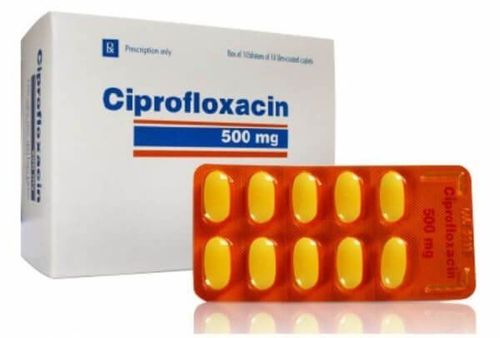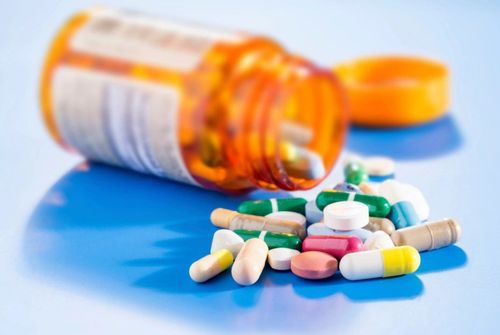This is an automatically translated article.
Rusdexpha 500 has the main active ingredient is Cephalexin 500mg and other excipients in sufficient quantity. This is an antibiotic indicated in the treatment of infections caused by susceptible bacteria, but is not indicated in the treatment of serious infections.
1. What is Rusdexpha 500?
Rusdexpha 500 has the main active ingredient is Cephalexin 500mg and other excipients in sufficient quantity. This antibiotic is indicated in the treatment of infections caused by susceptible bacteria, but is not indicated in the treatment of serious infections.
1.1. Pharmacodynamics of active ingredient Cephalexin Active ingredient Cephalexin is a first-generation Cephalosporin antibiotic, which has bactericidal effects by inhibiting bacterial cell envelope synthesis. The active ingredient Cephalexin is an antibiotic for direct oral use, with an antibacterial spectrum similar to that of the 1st generation cephalosporins. Cephalexin antibiotics are stable to Staphylococcus penicillinase, thus effective against penicillin-resistant penicillinase-producing Staphylococcus aureus strains. (or ampicillin). Cephalexin antibiotic has been used in vitro against the following bacteria: Streptococcus beta hemolytic; Staphylococcus, including strains secreting coagulase (+), coagulase (-) and penicilinase; Streptococcus pneumoniae; certain types of Escherichia coli; Proteus mirabilis; some types of Klebsiella spp. Branhamella catarrhalis; Shigella. Haemophilus influenzae is usually less susceptible. The antibiotic Cephalexin is also effective against most ampicillin-resistant E. coli. 1.2. Pharmacokinetics of active ingredient Cephalexin Absorption: Active substance Cephalexin is almost completely absorbed from the gastrointestinal tract. Taking drugs containing the active ingredient Cephalexin with food may slow down absorption, but the total amount of drug absorbed will not change. Distribution: The main active ingredient Cephalexin is widely distributed throughout the body, but the amount in the cerebrospinal fluid is negligible. Cephalexin can cross the placenta and is excreted in breast milk at low concentrations. Metabolism: Active ingredient Cephalexin is not metabolised. Elimination: Approximately 80% of a dose of Cephalexin is excreted unchanged in the urine during the first 6 hours by glomerular filtration and tubular secretion; With a therapeutic dose of 500 mg of Cephalexin, urine concentrations were higher than 1 mg/ml.
2. What disease is Rhinathiol used to treat?
Rusdexpha 500 is a medicine prescribed by a physician and is indicated for the treatment of infections caused by susceptible microorganisms, but not for severe infections.
Treatment of respiratory tract infections: acute and chronic bronchitis and infectious bronchiectasis. Treatment of ear-nose-throat infections: otitis media, tonsillitis, mastoiditis, sinusitis and pharyngitis. Treatment of urinary tract infections: Cystitis or prostatitis. Prophylactic treatment of recurrent urinary tract infections. Treatment of infections in obstetrics and gynecology. Treatment of infections of the skin, soft tissues and bones. Treatment of gonorrhea (when the use of penicillin is not suitable). Treatment of dental infections. Prophylactic treatment to replace penicillin for patients with cardiovascular disease requiring dental treatment.
3. Usage and dosage of Rusdexpha 500
3.1. How to use Rusdexpha 500 Rusdexpha 500 is used orally.
3.2. Subjects using Rusdexpha 500 You can only use the drug when prescribed by the doctor to treat the disease.
3.3. Dosage of the drug Rusdexpha 500 The usual therapeutic dose for adults, take 1 tablet / time, every 6 hours / 1 time, depending on the degree of infection. The maximum therapeutic dose for Rusdexpha 500 capsules can be up to 4g/day. The usual therapeutic dose for children: The usual dose is 25-60 mg/kg body weight in a 24-hour period, divided into 2-3 oral doses. In case of severe infection, the maximum dose is 100 mg/kg body weight in 24 hours. Note: The duration of treatment should last at least 7 to 10 days, but in cases of complicated, recurrent, chronic urinary tract infections, it is recommended to treat for a period of 2 weeks (dose of 2 tablets). /time, drink 2 times a day). For gonorrhea, usually a single dose of 3g (6 tablets) with 1g probenecid for men or 2g (4 tablets) with 0.5g probenecid for women. Concomitant use of probenecid prolongs the elimination time of active cephalexin and increases serum concentrations by 50-100%. To date, active ingredient Cephalexin has not been found to have nephrotoxicity. However, as with antibiotics that are eliminated primarily by the kidneys, this active substance can accumulate in the body when kidney function is reduced to less than half of normal. Therefore, the maximum recommended therapeutic dose should be reduced to suit these conditions. For the elderly, it is necessary to assess the degree of renal impairment and adjust the treatment dose in the presence of renal failure.
4. In case of over/forgotten dose of Rusdexpha 500
In case of drug overdose: After an acute overdose, mostly only causes nausea, vomiting and diarrhea, but can cause neuromuscular sensitization and seizures, especially in patients. patients with renal failure. Management of overdose should consider the potential for multiple drug overdoses, drug interactions, and unusual pharmacokinetics for the drug user.
There is no need to perform gastric lavage, unless the antibiotic Cephalexin is 5 to 10 times the normal dose. Dialysis can help clear Rusdexpha 500 from the blood, but it is not usually needed. Protect the patient's respiratory tract, enhance ventilation and infusion support. Give an overdose of activated charcoal several times in place of or in addition to gastric lavage. Note that it is necessary to protect the patient's respiratory tract while doing gastric lavage or using activated charcoal. In case of missed dose: Currently information on how to handle a missed dose of Rusdexpha 500 is being updated.
5. Undesirable effects of Rusdexpha 500
The rate of unwanted reactions of Rusdexpha 500 is about 3 - 6% in the entire number of patients treated.
Common undesirable effects of Rusdexpha 500 with ADR>1/100 are gastrointestinal disturbances, diarrhea, nausea.
Common adverse effects of Rusdexpha 500 are uncommon with 1⁄1000
Body as a whole: Headache, dizziness, anaphylactic reactions, fatigue. For blood: Decrease in neutrophil count, decrease in platelet count. For the digestive system: Digestive disorders, abdominal pain, pseudomembranous colitis. For skin: Stevens-Johnson syndrome, erythema multiforme, toxic epidermal necrolysis (Lyell's syndrome), Quincke's edema. For liver: Hepatitis, cholestatic jaundice. For the genitourinary system: Genital itching, vaginitis, reversible interstitial nephritis. Nervous system: CNS symptoms such as dizziness, vertigo, confusion, agitation and hallucinations have been reported, but no relationship with cephalexin has been fully demonstrated. You need to actively inform the treating doctor about the unwanted effects encountered when using Rusdexpha 500.
6. Rusdexpha 500 . drug interactions
Interactions of Rusdexpha 500
The use of Cephalosporin antibiotics or Rusdexpha 500 at high doses with other drugs that are also nephrotoxic, such as aminoglycosides or drugs with strong diuretic effects (namely furosemide, ethacrynic acid and piretanide). ) may adversely affect renal function. There have been no clinical problems with Rusdexpha 500 at recommended doses. There have been reports that the active ingredient Cephalexin reduces the effect of estrogen in oral contraceptives. Cholestyramine binds to cephalexin in the intestine, slowing its absorption. This interaction may be of little clinical importance. Probenecid increases serum concentrations and increases the half-life of the active substance Cephalexin.
7. Some notes when using Rusdexpha 500
7.1. Contraindications of the drug Rusdexpha 500 Rusdexpha 500 drug is not used for patients with a history of allergy to cephalosporin antibiotics. Rusdexpha 500 should not be used in patients with a history of anaphylaxis caused by penicillin antibiotics or other severe reactions mediated by IgE immune globulin. 7.2. Precautions while using the drug Rusdexpha 500 Cephalexin antibiotics are generally well tolerated even in people allergic to penicillin, but there are also a very small number of cross-allergies. As with other broad-spectrum antibiotics, prolonged use of Rusdexpha 500 may result in overgrowth of non-susceptible organisms (specifically Candida, Enterococcus, Clostridium difficile), in which case it should be stop medication. Pseudomembranous colitis has been reported with the use of broad-spectrum antibiotics, so care should be taken in the diagnosis of this disease in people with severe diarrhea during or after antibiotic use. Use during pregnancy: Experimental studies and clinical experience have not shown any signs of fetotoxicity and teratogenicity. However, Rusdexpha 500 should be used during pregnancy only when clearly needed. Use with lactation: Cephalexin concentrations in breast milk are very low. Even so, consideration should still be given to stopping breastfeeding while the mother is taking Rusdexpha 500. Effects on the ability to drive and use machines: Not yet known. Above is all information about Rusdexpha 500, patients need to carefully read the instructions for use, consult a doctor / pharmacist before using. Absolutely do not arbitrarily buy Rusdexpha 500 to treat the disease at home, because there may be unwanted side effects on health.
Follow Vinmec International General Hospital website to get more health, nutrition and beauty information to protect the health of yourself and your loved ones in your family.
Please dial HOTLINE for more information or register for an appointment HERE. Download MyVinmec app to make appointments faster and to manage your bookings easily.













